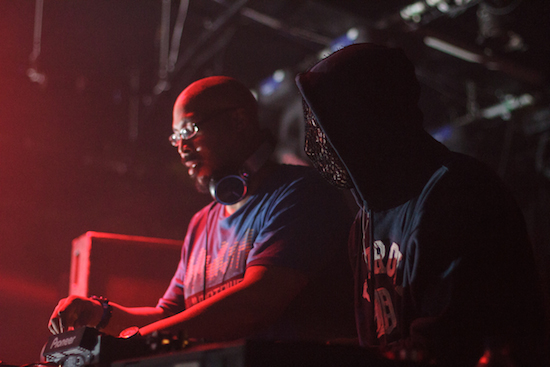The realisation hits some time around 3pm on Saturday afternoon, as we drift aimlessly among dozens of tired faces around the lazy river at Butlins Minehead’s life saver of a swimming pool – Bloc Weekend is back at its holiday camp home, and it feels happily like business as usual. Perhaps slightly too much so at times, in a four-to-the-floor heavy line-up that’s fairly short on the disorienting rhythmic curveballs that would always lend the early hours at Bloc a cheekily unstable air to match the mood of its attendees. Nonetheless, it’s a pleasure to return to the drizzly grey west for the festival, and to return to the venue itself; with its architecture and infrastructure a seamless meld of fun, functional, booze-soaked, knackered and naff, it’s still hard to imagine a better suited place in the UK to host a three-day rave. Here’s what the Quietus learned during a whistlestop 48 hours…
Butlin’s is where Bloc belongs
The shadow of Bloc’s disastrous and well-documented 2012 festival cancellation in East London looms large over this weekend. As their first major event in three years, and a return to the Minehead holiday camp which hosted them between 2009 and 2011, the 2015 edition is a clear attempt to reassert the Bloc brand and draw a line under the past.
Initially, this creates some dissonance. The FAQ page for 2015 attendees opens by asking “What happened in 2012?”, pre-emptively heading off questions. The weekend before the event, meanwhile, criticism of the lineup’s noticeable gender disparity prompted a disappointingly tetchy and defensive response from Bloc on Twitter, as if tired of the constant criticism and scrutiny. This January 2015 interview with Bloc owners Alex Benson and George Hull is similarly uncomfortable at points, answering some questions but leaving others opaque. But being overly cynical here feels unfair; Benson and Hull might not divulge all the financial details (there may well be legal considerations, one assumes) but their remorse feels absolutely genuine, as does their earnest desire to recapture Bloc’s successes prior to 2012. Unlike the recently-resurrected ATP weekenders, whose failures have been far more common and explanations far less convincing, it’s difficult to begrudge Bloc the opportunity to prove their doubters wrong, even if they’re not starting from a completely clean slate.
In the end, Bloc 2015 thoroughly justifies giving its promoters this second chance. Admittedly the weekend is not flawless: the line-up feels slightly more conservative than in previous years, and there are also a couple of issues with the sound. Yet these feel like minor problems: the organisation of the weekend is overwhelmingly smooth and unobtrusive (rigorous searches on arrival notwithstanding), the atmosphere bubbles with positive energy, and being back at Butlin’s feels reassuringly familiar. More importantly, the overall standard of music is superb: the line-up may be safe, but it’s carefully put together and of uniformly high standard. If the aim was to return Bloc to its roots without further controversy, then this weekend absolutely succeeds. Ed Gillett
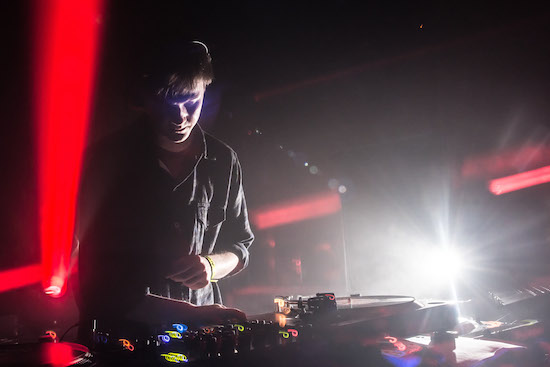
Good things come in threes
With Bloc’s peak-time line-up so geared towards techno, subtle differences in how DJs and performers work within similar constraints are brought more starkly into focus. In particular, three of the best sets from the weekend happen to be based around three solo performers working together, with each performance veering off in markedly different directions.
Livity Sound’s live show on Friday night is utterly engrossing and strikingly fluid: each new sonic element is brought smoothly and gracefully into focus, tracks blending seamlessly into each other; group members and label heads Kowton, Peverelist and Asusu each work attentively on their own equipment, but also lock tightly and wordlessly into each other’s cues. Their sense of studiousness is supplemented by physical impact. The volume increases halfway through the set, bringing to life its flawlessly-mixed subs and skittering, rubbery rhythms; ‘Aztec Chant’ in particular benefits from being beefed up with hefty 4/4 kicks. There’s emotional depth though, too: the lush chords of ‘End Point’ mark the weekend’s first moment of collective euphoria, delivered at precisely the right time and careful not to outstay its welcome. In their delicate, considered approach, Livity build something quietly devastating.
Hessle Audio provide a vastly more muscular and aggressive experience later the same evening. They work in shifts, with each of the three-strong crew taking twenty or thirty minutes at a time, overlapping with each other only briefly before the previous DJ retreats backstage. Pearson Sound’s blend of Jersey kicks and rolling, trap-like snares is swaggeringly efficient, his mixing precise and sleek, like a well-tuned sports car; Pangaea shifts into darker territory with jittery and insistent techno, suffused with a sense of urgency and dread. Ben UFO’s selections come instead with a 1980s sheen: Levon Vincent’s ‘Woman Is An Angel’ sits in the middle of shimmering deep house and straightforward jacking acid tracks. As the night progresses, it becomes harder and harder to discern who’s playing what, partly because of Hessle’s ability to flit between genres so instinctively, dissolving stylistic distinctions with consummate ease, and partly because an over-active fog machine has filled the room with smoke, making it impossible to see the stage. This actually helps underline the experience: the way Hessle play is best understood as a subtly shifting whole, finding unexpected gaps and links between numerous different genres.
Notions of purism are chucked even more thoroughly out of the window during Moodymann’s joyously raucous set, which ends up as another three-way session, with Kenny Dixon Jr. flanked by fellow Detroit stalwarts Omar-S and Rick Wilhite. The mixing here is pure instinct: sometimes it’s chaotic and off-key, at other moments, such as when Andres’ ‘New For U’ drops and the crowd erupts with glee, there’s a feeling of delirious serendipity. Each DJ hangs out next to the decks as the others play, offering encouragement and energy. Someone cuts into ‘Got Your Money’ by ODB and the whole room blasts out in a messy sing-along; Moodymann grabs the mic repeatedly to shout out Detroit and spur the crowd on: “I want y’all to get hyped,” he demands. Amid the mayhem unfolding around him, such encouragement feels beautifully unnecessary. Ed Gillett
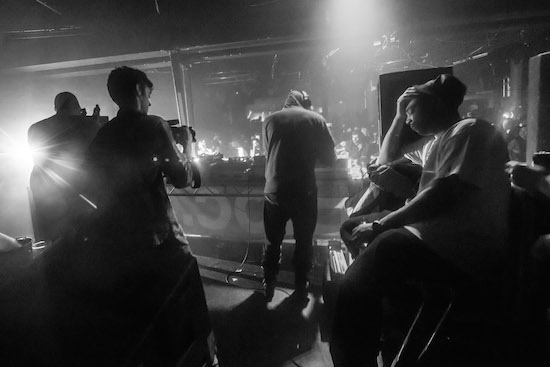
“Detroit, the air I breathe”
It’s Saturday evening, and the atmosphere in basement venue Red’s is so dank, thick and pungent that it rolls around your mouth as you breathe. A gobstopper flavoured with stale lager, sour sweat and the lingering ghosts of cigarette smoke, it’s hard to tell whether it’s emanating from the festival-goers or the room itself. The sound in here is equally volatile, and earlier in the day its shifting levels repeatedly frustrate Levon Vincent’s otherwise admirable efforts to establish a consistent mood. Following a searingly loud first half-hour, a dip in volume changes the sonic character of the room almost imperceptibly, and the intensity of his tracks – expansive and reverberant, yet rich with subtle detail – dissipates like steam amid rising chatter.
Right now, though, Alex ‘Omar-S’ Smith’s choppy and impulsive mixing style is making active use of the space’s unpredictabilities. He leans harder and harder on the EQ as his set progresses, cutting out and slamming in the low end as if he’s yanking a rug from under the dancing crowd’s feet, twisting up the highs to turn hi-hats and diced diva vocals shimmery and abrasive, repurposing the mixer as a thermostat to monitor the temperature of the room. Like his own music and the tracks he releases through his FXHE label (of which plenty are aired tonight), Smith’s DJ sets unfurl as a maze of contrasts and apparent contradictions; sandpaper-rough tones tap out elegant melodies, MK’s hothouse organ riffs chafe against skeletal beats that clatter like rickshaws, and ebullient disco breakdowns abruptly slide downward into tough, tweaky techno. Mostly straight-faced throughout, save a lovely moment late in the night where he breaks into a grin and a chuckle, Smith himself offers no resolution to these questions and challenges – dancing to them, however, certainly does. Rather like the sensation of watching Theo Parrish at his best, the warmth, emotional openness and playfulness of Smith’s selection and mixing complements the absolutely uncompromising nature of his personality as a DJ, but in a knotty, complex way that’s as pleasurable to move to as it is to reflect upon afterwards.
It’s a little essentialist for my liking to simply ascribe these characteristics to a city’s worth of musicians, especially a city I’ve never visited. Nonetheless, something similar is at play in the music of several of the Detroit artists hosted at Bloc this weekend – total focus mixed with a looseness, a willingness to allow each successive track to dictate the direction the music wriggles next. Smith’s set proves to be the beginning of an impromptu session of sorts; Moodymann follows with an hour of dust-addled grit and sweaty funk, before he’s joined onstage by surprise guest Rick Wilhite, and later Smith once again. The last half-hour finds the three stepping up track-for-track, with the similarities and differences between their respective styles – KDJ low-slung and cheeky, Smith focused and resolute, Wilhite warm, spaced-out and welcoming – amplified by a few hundred people dancing to follow each switch-up in mood. Rory Gibb
It all depends on how you spin it
It’s relatively rare to read people writing at length about the idiosyncrasies of different DJs’ mixing styles, strange considering how much of someone’s personality is communicated through the way they sequence and mix records, especially over extended timeframes. So one unexpected but welcome consequence of the dominance of four-to-the-floor techno and house at Bloc this year is the way it highlights this particular distinction between artists. You might hear the same record played several times over the course of two days, but it’ll never sound the same twice. Call Super and Rick Wilhite both drop Karim Sahraoui’s gorgeous, translucent ‘Nightflow’, for example, but in such different contexts as to completely transform its impact. Back-to-back with Moodymann, in Wilhite’s hands it’s a subtle notch down in intensity, with its glittery saxophone noodlings feeling improvised and almost off-the-cuff within a set heavy on dusty soul and funk references. By contrast, when Call Super plays the same track at 2:45am on Friday, in a room bathed in flickering blue light, it takes on an elemental, tidal presence, its sax blasts now transformed into grandly dramatic gestures, questing towards an unknown resolution.

Paula Temple’s early Saturday evening set wields furnace-hot, metal machine techno, but with a deftness of touch that’s striking for music so physically heavy: acres of space remain open around the crunch and roar of collapsing sheet steel and the hollow boom of kickdrums, so rather than overtly claustrophobic her DJing feels freeing and lightfooted, while still stormingly intense – an enjoyable contrast to the impact-led feeling of sets by contemporaries like Perc. Equally, what’s enjoyable about both Hessle Audio and Omar-S’s sets this weekend is the sense they give of gene-splicing; of mixing records not just as a path from A to B or as a method to maintain momentum, but as a dynamic process of isolating desired characteristics from one track and transplanting them into others around it, so the resulting entity becomes something subtly different than the sum of its parts, itself in a constant process of change as the mix evolves through time. Yet both achieve that in very different ways. Smith’s set feels like a game of rough and tumble, with tracks rebounding off against each other and percussion spattered through the mix like paint flung against a wall. During the Hessle Audio Friday night extended takeover, meanwhile, Ben UFO, Pearson Sound and Pangaea build a narrative over time such that each tune seems to internalise some of the characteristics of the others not just adjacent to it, but also those several steps forward and backward in time.
Another staunchly uncompromising Detroit resident at Bloc this year is the largely under-sung Eric Dulan, aka DJ Bone, an exciting face on the bill. Sadly, he’s tucked away late on Sunday night, by which point we’re on our way back to the capital. However, he’s another DJ with a remarkable approach to mixing – hard-as-nails yet impressionistic. Dulan uses three or four decks almost like paintbrushes, layering up a background of kickdrums and percussion, swirling of synaesthetic colour, vocals and fragmented rhythms through the mix, stirring up a sea of elements moving so fast they blur together. The result feels like being immersed in a whirlwind of ever-shifting colour, or like having your motor system hijacked by powerful yet benevolent forces beyond your control, depending on what time of the morning it happens to be. At a time when techno-in-sound has largely become well codified, the intense shock factor of Dulan’s music – especially in the mix – forces a reassessment of long-established critical narratives around the experience of newness in dance music, especially the notion that it must lie in structural ruptures or drastic breaks from reference to past forms. Formally, DJ Bone’s music does neither of those things, being explicitly rooted in a fairly classicist Detroit techno sound. Yet the way he works with rhythm creates a thrilling jolt of unfamiliarity: the four-to-the-floor kick is used as anchor rather than focal point, and acts as a subliminal driving force around and above which other rhythmic structures take precedence, pulling your body this way and that like ocean currents. Rory Gibb

Ladies and gentlemen, we are floating in space
The same degrees of freedom are felt equally in Jeff Mills’ music, which has lost none of its capacity to enthrall. Throughout his three-hour Saturday night set, the music regularly peels away from the hard, jacking pulse of his drum tracks and 909: snares hit and ricochet outward at peculiar angles, refolding the music’s superstructure as easily as if it were origami paper, while spacecraft instrument bleeps sluice and whirl through the newly opened spaces within. We dance for the duration, with the crowd looking increasingly out-of-body as the music’s hypnotic sameness distorts time around them. What remains so striking about Jeff Mills’ music is the depth of thought that he brings to his evocation of the relationship between humans and deep space – it permeates his work, and gifts it much of its force. The same sense of conviction is what makes his former UR co-voyager Robert Hood’s set the previous evening another highlight, but in Hood’s case it stems from his Christian faith. Both ‘We Magnify His Name’ and ‘Never Grow Old’ meld gospel song and techno, driven forward by the unstoppable forward momentum characteristic of Hood’s music, and it’s a pleasure to watch Bloc’s Friday night main room crowd singing along to the former at 5am.
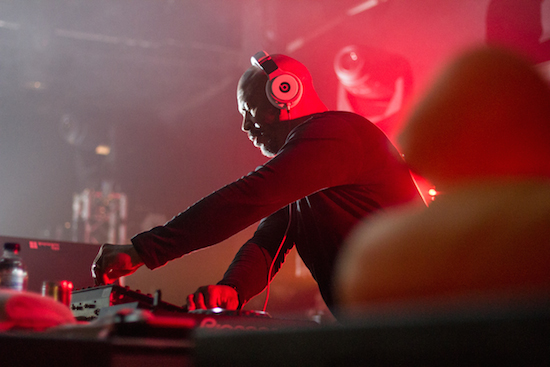
More even than Mills, though, it’s Freerotation founders Steevio and Suzybee who take things into zero-G. Their take on improvised techno sounds very little else, and arriving in the middle of Saturday night’s proceedings feels rather like jumping back into the swimming pool’s lazy river and being borne along by the rushing water. Played from a huge spacecraft cockpit of a modular synthesiser, it glides along almost friction-free: there’s acres of space between its metronome tick percussion and the weird, molten melodies that swoon and coast somewhere high up in the atmosphere, making it unusually non-prescriptive to dance to – it’s fun just to watch the small but devoted crowd take advantage of the opportunity to move in a entirely more free-flowing manner. As with Steevio’s Modular Techno series and his marvellous recent Cyfnos 12”, however, it’s the harmonies that raise the hairs on the back of the neck: they’re crystalline and inorganic in texture yet feel strangely sentient, pulsating, glistening and subdividing like a boxful of gemstones that’s acquired the characteristics of a bacterial colony. It’s this sense of composition operating on multiple temporal and spatial scales – of zooming both in and out simultaneously, with a microscopy of textures splaying outward into a rush of lateral momentum – that makes the performance so mesmerising, and one of the weekend’s hidden rewards.
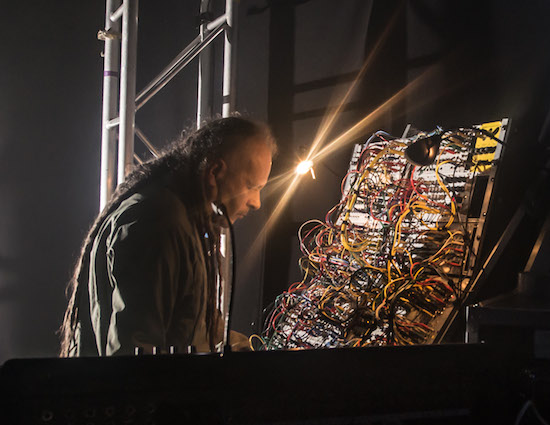
Going off-grid: breaking the 4/4 wall
Techno might dominate the headline spots at Bloc this year, but it’s far from the only thing on offer. There’s a wealth of different rhythms and sounds to dig into, freed from the constraints of a strict 4/4 kick and less beholden to the influences of Detroit or Berlin. One of the weekend’s hidden delights is Shanti Celeste’s set in the Pub on Saturday night. Her take on house music is fleet-footed and infectious fun, skipping adroitly between classic and contemporary sounds, weaving in threads from garage and electro without ever becoming overly precious about it. The atmosphere is welcoming and close-knit, closer to a house party than a festival – at one point a bunch of lads in stag-do camel costumes and comedy sombreros arrive, and are greeted like old friends.
ESG aim for the same party atmosphere on Friday, but their appearance on the main stage falls just short. Seeing them live last year was a warmly celebratory experience, with the band’s revised lineup helping the Scroggins sisters roll back the years in fine form. Here, while songs like ‘Moody’ and ‘Dance’ still have undeniable power and funkiness, the band suffer from their surroundings, feeling decidedly underpowered in comparison to the pounding electronic noise around them. As they play, you can feel the vibrations from Hessle Audio downstairs pulsing through the floor with almost equal force. It’s a real shame, as in a more sympathetic context they would have been superb.
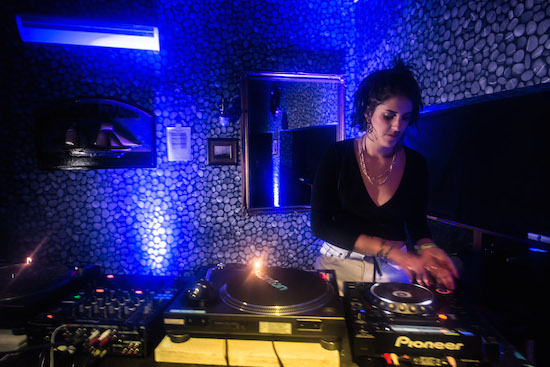
Volume and impact are the defining characteristics of Clark’s set on Saturday night. On record, his music is almost inhumanly crisp and well-produced; live, he plays the tracks almost completely straight, allowing their pristine sonics to expand in monstrous fashion, like Tetsuo’s transformation in Akira, filling the room and juddering the senses. The simple act of blasting ‘Unfurla’ at pummelling volume reaps particularly pleasing results. It might be a dreamy and melodic thing in the context of Clark’s recent self-titled album, but gains several stone of pure muscle in a big room. ‘Banjo’ and ‘Superscope’, on the other hand, would sound banging on even the smallest systems; here, they feel capable of warping the walls and floor through sheer force of sound. The set ends with ten minutes of junglist mayhem and ambient droning, with dynamics reminiscent of a post-rock band, made even more visceral by the clarity of their electronic sources.
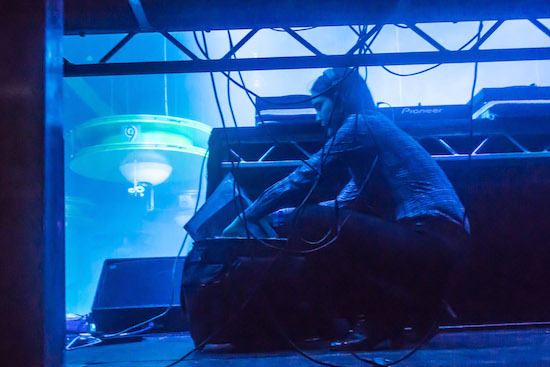
Jungle is a far more prominent component of Millie and Andrea’s sound, along with rave and more recent influences from sluggish, half-time trap production. Although their recorded output has a pleasingly grim layer of tape noise and grunge, in the live context rhythms flash past in the blink of an eye, and while there are denser sections and occasionally abrasive sounds, you never feel like you’re being hit over the head with them. The same is true of Helena Hauff’s DJ set two hours earlier. Mining a rich vein of 80s EBM and newer off-kilter techno, her style of DJing is austere and measured but also surprisingly fun. In both cases, although the music on show is ostensibly dark in tone, the experience of watching it feels elevating and oddly pleasant.
In the best possible way, the same can’t be said of Autechre. Performing in pitch-darkness and at maximum volume, their live performance is both enthralling and difficult to fully grasp or endure. They begin with a surprisingly coherent rhythmic framework, albeit stretched to its limit. Eventually, any recognisable structures are overtaken by malformed acidic growls, chittering clockwork rattles and occasional bursts of somnolent harmony. Half an hour in, this restless shifting is abruptly punctured by a pounding kick and fizzing drones; these slowly decay and compact into digital sludge, punctuated only by a snare drum cutting through irregularly. The effect is overwhelming – I’m simultaneously transfixed, struck by deep-seated existential anxiety, and acutely nauseous. Ed Gillett

